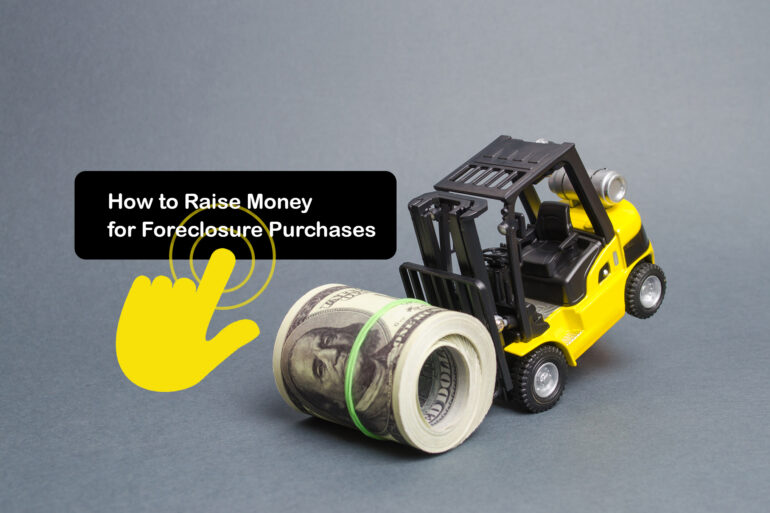How to Raise Capital for Foreclosure Purchases
The world of foreclosure remains filled with opportunity for Florida real estate investors. Contrary to 2020 and 2021, there are no more federal or Florida protections against foreclosure filings or activity, nor against filings to help investors recover possession of foreclosed properties.
In the first half of 2022 alone, there were over 4,700 foreclosure cases filed. At this point, a wise investor should be asking themselves, how can I take advantage of this growing opportunity?
Foreclosure Sales Require a Different Approach
Foreclosure sales are not conducted in the traditional manner (i.e., in a title company’s or attorney’s office with funds held in escrow, traditional lenders, and warranty deeds).
To bid at a Florida foreclosure sale, investors must register via the clerk’s online foreclosure sale servicer or with the clerk for the live auction (yes, there are still a few counties in Florida that conduct these live!) and must deposit sufficient bid funds at least a week in advance of the sale (when online). In our e-books section, we provide the full step-by-step process.
The sales are generally conducted by the clerk either at 10 a.m. or 11 a.m. local time via a third-party auction house like RealAuction. Check with the specific county for auction times and online bidding locations as these sometimes vary.
Bidding is done in a minimum of $100 increments. You can see all the dates and times of upcoming foreclosure and tax deed auctions on PropertyOnion.com’s property search section.
For online sales, the successful maximum bidder is notified via the website and email of the bid fee, clerk sale and registry fees, and document stamp taxes that will need to be paid in full by noon the next day. For live auctions, the final call and gavel of the clerk announces the winning bidder and the immediate 5% payment that must be deposited to secure the bid. The balance must be paid by noon the next day in most jurisdictions.
The key is to have all funds on hand, as the clerk will not wait for an investor to have a traditional lender underwrite the purchase. Herein lies the elephant in the room for many investors. While more experienced and successful investors may have access to sufficient personal retirement funds to participate in the process, a less experienced investor typically does not.
What, then, can younger or less financially well-off investors do to access capital to participate in these auctions? I’ve created a list of practical steps investors can take to help them secure funding for foreclosure purchases.
1. Increase Your Personal Credit Score by Snowballing Debt Payoff
You may be asking yourself, why would a hard money lender care about my personal credit score?
Hard money lenders and small business lenders have learned from the mistakes of traditional banks that led to the collapse of several financial institutions. They are engaging in in-depth due diligence. They want to know the investor they’re lending to is not only responsible with credit, but also responsive and strategic about how they use that credit.
2. Get Your Business Financials Up to Date
If you want a business loan, you will get asked about a profit and loss statement and potentially about a projections budget and budget variance report. These statements provide lenders (private and small business lenders) information about cash flow management in the three months before the loan and presently to identify if you can manage funds and attract sufficient revenues to service their loan.
Even if you’re brand new, having accurate and sensible written ARV calculations or rental income calculations will demonstrate that you intend to take the foreclosure project seriously, you’ve done your homework, and you know what you need to do to make it work.
3. File Personal Tax Returns in a Timely Manner
Even “no doc” lenders will require a review of your most recent (often two years, but sometimes three years) personal and/or business tax returns. This allows them to determine if you have a sufficient income to service their loan.
It also will assist them in determining whether the interest only, points charged, and amortization you’re contemplating is feasible.
4. Run Verifiable and Realistic Calculations for Your ARV
If you are bidding for property that you can acquire, upgrade, and resell within 3–6 months, then you must have verifiable figures you can present to a short term, hard money, or slightly more traditional real estate investor lender. This is not a time for puffery.
You must know and be able to present the following in a coherent and organized manner that shows the deal makes sense:
- Labor and material costs
- Legal expenses to take care of title issues and possession issues
- Time for repairs and upgrades
- Delays in the supply chain
- Recent comparable sales of improved properties within a mile of the property
- Neighborhood trends
5. Run Verifiable and Realistic Calculations for Cash Flow
If you are bidding for property that you can acquire, upgrade, and rent within a couple of months, you must have verifiable figures that show you’ll have positive cash flow as soon as the upgrades are made.
You’ll also need to prove that you have the right contractors in place, and that the expected rent makes sense with the location, potential number of tenants, median household income for the area, management company expenses, legal expenses for leases that will truly protect your investment, retained earnings for regular expenses, and retained earnings for capital improvements.
6. Ask for the Money
Sounds simple, right? This is probably the most difficult part for many real estate investors. Why? Fear.
Fear of rejection. Fear of not being good enough. Fear of not having enough. The reality is that getting money from sources other than yourself requires developing and strengthening your sales skills. You may have to ask 15, 20, or 25 investors before you come across one who is interested in the deal, has the funds available when you need them, and understands the transaction.
It’s ok to hear “no.” You’ll hear plenty more Nos than Yeses as a real estate investor. What will make you successful is continuing to ask for what you need and what you want when others stop at “no.”
Once you decide you want the property, you must commit to doing what is necessary to make it yours.
Taking these six steps is guaranteed to increase the likelihood of you landing the funds you need for a foreclosure purchase. Remember, it’s the ones who don’t do that don’t succeed.








